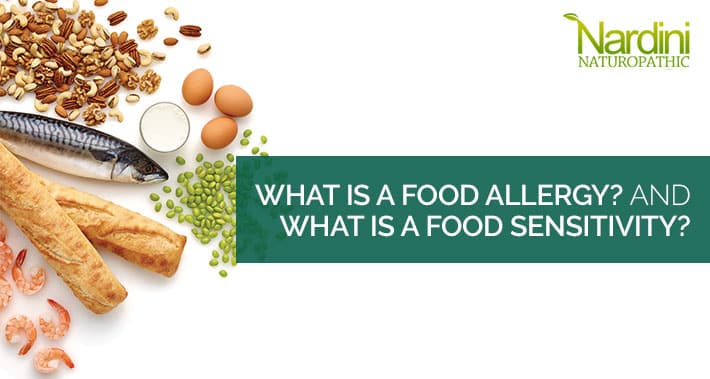As a naturopathic doctor, I encounter many people who have a dietary restriction due to food allergies and food sensitivities.
But what is the difference between the two?
And what can you do if you have a food allergy or sensitivity?
The best way to help yourself is to start by learning the difference and then getting some nutrition advice on how best to deal with it.
What Is A Food Allergy?
A food allergy occurs when the body treats a certain food the same way it would treat an invader like a bacteria, fungus, or common cold.
When you have a food allergy, the body responds by producing antibodies to fight it.
This means that your body is producing an immune-mediated reaction to the food.
The most common reaction to food allergies is an immunoglobulin E (IgE)-mediated reaction.
IgEs are allergic antibodies that cause an immediate reaction by triggering the body to release chemicals, such as histamines, in response to exposure to an allergen1.
Food Allergy Symptoms
Unlike a food sensitivity or intolerance, reactions to food allergies can be fatal.
In extreme cases, a reaction can be caused by ingesting or even touching a small amount of the allergen. Common food allergy symptoms include:
- Skin reactions (hives, swelling, itching)
- Anaphylaxis (difficulty breathing, wheezing, dizziness, and in some cases death)
- Digestive issues
Most Common Food Allergies
Surprisingly, just 8 foods are responsible for 90% of food allergies. These foods include:
- Milk
- Eggs
- Fish
- Shellfish
- Peanuts
- Tree nuts
- Wheat
- Soybeans
Other food allergies are less common, but may include:
- Sulphites
- Red meat
- Avocadoes
- Gelatin
- Corn
- Mango
- Nitrates
What is a Food Sensitivity?
A food sensitivity or intolerance occurs when the body is unable to process or digest a certain food.
Unlike food allergies, they are a delayed immune response and are generally not life threatening.
Food Sensitivity Symptoms
Symptoms of food sensitivity can vary but they are often related to digestion. They can include:
- gas and bloating
- diarrhea
- constipation
- cramping
- nausea
Pinpointing the symptoms of a food sensitivity can be tricky, because they don’t tend to manifest right away.
Whereas someone with a shellfish allergy generally knows within seconds if they ate something they shouldn’t, someone with a gluten sensitivity might not feel the repercussions for several hours after eating gluten.
What Causes Food Sensitivities?
A food sensitivity can be caused by a number of reasons. Here are some common ones:
- not having the right enzymes to break down a particular food
- a reaction to an additive or preservative such as MSG, sulfites, or artificial colours
- pharmacological factors such as sensitivity to caffeine or other chemicals
- sensitivity to the sugars found naturally in certain foods like broccoli, onions, or brussels sprouts
Food Allergy or Food Sensitivity?
Food allergies and food sensitivities are often lumped in with each other, for obvious reasons.
But there are some important differences to note from a clinical perspective.
The main difference between a food allergy and a food sensitivity is how the body responds to it.
When you have a food allergy, your body responds with the immune system as if it’s fighting off an invading pathogen.
When you have a food sensitivity or intolerance, the body tends to react through the digestive system, although the immune system is also involved.
Another important difference is the amount of food that it takes to trigger a reaction.
If you have a food allergy, even a tiny amount can trigger a reaction. With a food sensitivity, a tiny amount will typically do nothing at all.
Because the symptoms of an allergic reaction are so severe, the vast majority of those with food allergies are well aware that they have them.
On the other hand, the symptoms of a sensitivity reaction may not manifest for several hours after eating. As a result, it’s not uncommon for my patients to react with surprise at finding out that they have a food sensitivity.
While both are serious issues, a food allergy can be life threatening.
Book An Appointment With Nardini Naturopathic
Do you have a food allergy and want to make sure you’re getting the right amount of nutrition?
Are you dealing with digestive issues and curious about whether you have a food sensitivity?
If so, contact me today and let’s book an appointment.
I’m Dr. Pat Nardini, a naturopathic doctor. I can help you figure out what foods are best for you and what you can eat to achieve optimal health.
Food intolerance symptoms can be frustrating, but there is help.
Contact me, Dr. Pat Nardini, and let’s get to the bottom of your food woes.
If you have questions about naturopathic medicine, or you’d like to take your first step into the world of naturopathy, contact us at Nardini Naturopathic, and let’s book an appointment.
Yours in health,
Dr. Pat Nardini, Naturopathic Doctor
320 Danforth Ave suite 206,
Toronto, ON, M4K 1N8
-https://g.page/NardiniNaturopathicDanforth
Dr. Pat Nardini, ND is a licensed doctor of naturopathic medicine in Toronto, Ontario. He offers science based natural health solutions with a special focus on thyroid conditions.


